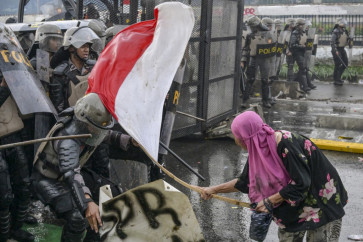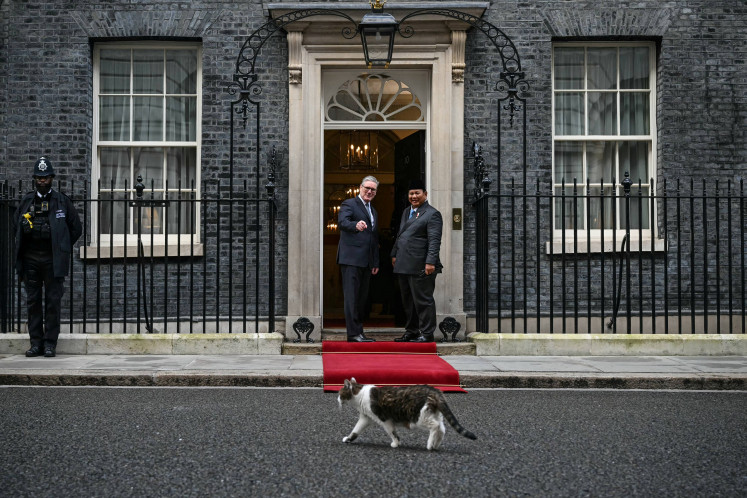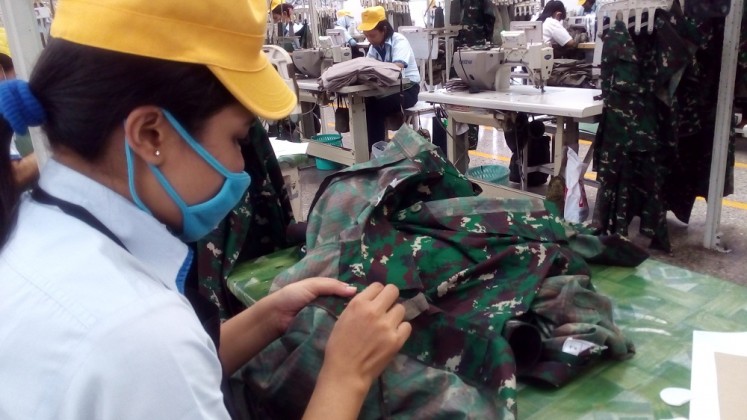Popular Reads
Top Results
Can't find what you're looking for?
View all search resultsPopular Reads
Top Results
Can't find what you're looking for?
View all search resultsIndonesian democracy under threat: Experts
Experts have warned that a parliament without an opposition party is a slippery slope toward an authoritarian government, without any credible force to criticize its policies
Change text size
Gift Premium Articles
to Anyone
E
xperts have warned that a parliament without an opposition party is a slippery slope toward an authoritarian government, without any credible force to criticize its policies.
President Susilo Bambang Yudhoyono has been trying to gain parliamentary support from all parties, especially the Indonesian Democratic Party of Struggle (PDI-P) and the Great Indonesia Movement Party (Gerindra), by tempting them with ministerial posts, Bonni Hargens, a political expert from the University of Indonesia, said on Wednesday.
But without an opposition, the government risks becoming too strong and acting like the New Order government, which was unwilling to hear the people’s demands, Bonni said, when discussing prospects for the new government.
He criticized the President for not prioritizing the people’s welfare in his first five-year term and feared the situation would deteriorate in his second mandate if no one was willing to question his decisions.
“I call for the PDI-P and Gerindra to do their best for our nation by becoming opposition parties,” he said.
“These parties should balance the government’s power in the parliament. That would prove their sincerity by prioritizing the public interest over their aspirations to rule.”
However, Bonni doubted the parties would take such a stance.
Over the last five years, the PDI-P has positioned itself as an opposition party in the parliament.
However, the Democratic Party, established by Yudhoyono, recently supported Taufik Kiemas’ candidacy — the husband of Megawati Soekarnoputri, patron of the Democratic Party — for the People’s Consultative Assembly (MPR) speaker post.
Analysts said the support from the President’s party showed the PDI-P might reverse its stance and support the government.
Kasmir Tri Putra, a member of the Regional Representatives Council, said a big coalition of all parties in the parliament could also be harmful to the next Cabinet.
“In order to be successful in making laws to support his government, the President will try to gain the parties’ support by establishing a Cabinet that will accommodate their interests,” said Kasmir.
On the other hand, the parties’ levels of support for the government will depend on their satisfaction with the Cabinet’s composition, he said.
He added that gaining other parties’ support would be essential for the government since the President’s party, the Democratic Party, had only gained 20 percent of the House of Representative seats.
To prevent Indonesia’s democracy from becoming a government-parliament conspiracy, an opposition party was badly needed, said Kasmir.
Without an opposition force in parliament, the people can only voice their objections to the government from outside the ineffective parliament, he said.
However, Syarief Hasan, chairman of the Democratic Party faction in the House of Representatives, said that the experts’ fears would not materialize.
“I appreciate the warnings they gave about Indonesia turning into an authoritarian state. But the President still wants a checks and balances system in the parliament,” he said.
He added that the composition of the Cabinet was down to the President. The most important thing was for the President to chose credible candidates.
When asked about the President’s priorities during his second term, Syarief said SBY would focus on improving the country’s economic situation and maintain security.
The government also planned to decrease the national budget used for importing oil by improving the usage of renewable energy sources.
To improve the economic situation in regional areas, the government will allocate more funds toward
infrastructure, and will also focus on raising agricultural production,
he said. (mrs)










